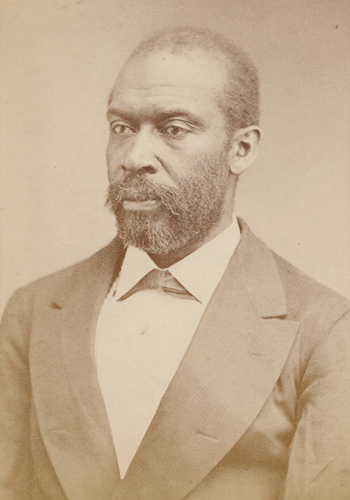Note: This primary source page calls upon students to read a graphic depiction of a slave auction written by Frederick Douglass. You may determine this text is not appropriate for your class and simply skip to the next case study. Or you may decide to provide additional context to your students before examining the clip.
Frederick Douglass and Thomas Morris Chester were Black journalists during the Civil War era. Douglass, publisher of the abolitionist North Star from 1847 until 1851, was born an enslaved person in Maryland in 1818. After several attempts, Douglass was able to escape slavery in 1838. With money borrowed from friends he bought a printing press and published his abolitionist weekly. Chester, the only Black war correspondent to cover the war for a major daily newspaper, wrote his first dispatch after the fall of Richmond from the speaker’s chair in the Confederacy’s capitol building.
Douglass and Chester appealed to the consciences of their readers by describing the realities of slavery in frank, unsparing, and sometimes deeply personal eyewitness accounts, such as in Douglass’s recounting of attending a slave auction below.
Directions
Use the magnifier to answer the following questions from the article “Southern Slavery, by an Eye-Witness” by A.S.W., a journalist from the New York Tribune, cross-published in Douglass’s North Star paper.
The North Star (Rochester, N.Y.), July 4, 1850. Library of Congress
Questions
Annotate this Image
Thomas Morris Chester was the first African American correspondent in the Civil War to report from the frontlines for a major newspaper.
Directions:
Take a look at a few of Chester’s dispatches for the Philadelphia Press right after the fall of Richmond, the Confederacy’s capital in Virginia. Use the magnifier to help you. How does Chester let the reader know that he is writing as an eyewitness? From where does he write his first dispatch? Who is present as the Union soldiers enter Richmond? Give a couple of specific examples of the tone and style of Chester’s writing. Why do you think it was important for Chester to capture the reaction of African Americans, including formerly enslaved people? Which aspect resonated with you the most and why? What attention is paid to the troops who first entered Richmond? Why do you think this was an important issue at the time? Download the notes to share with your class.
Use the toggle button above to switch to Magnify Mode. Magnify mode will help you see finer detail in the image.
Switch back to Annotate Mode to create your annotations with click and drag.

Your Annotations






